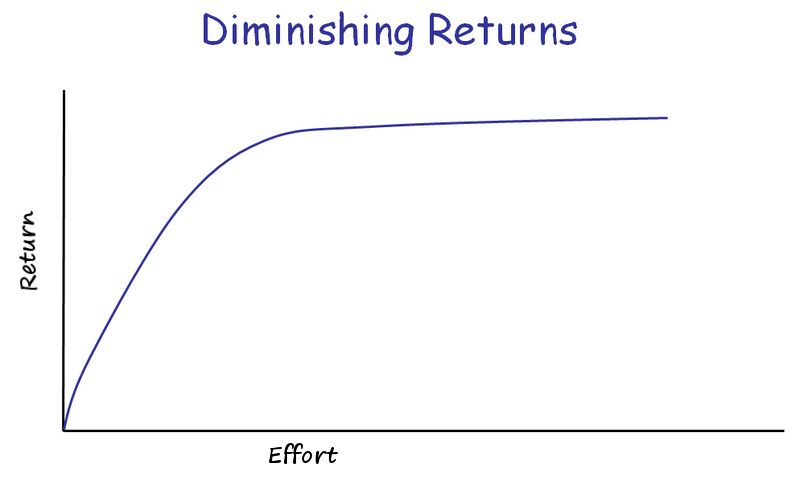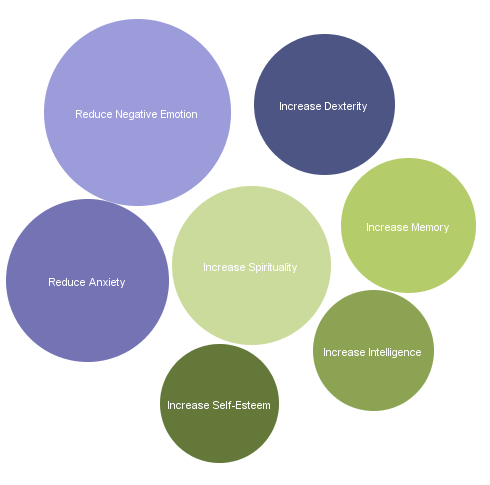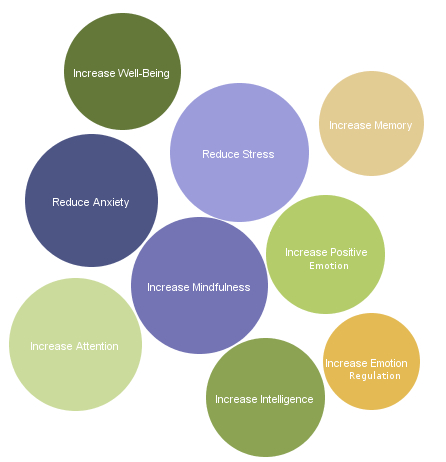Meditation is HARD.
Keeping still and staying focused is so unnatural that most who give meditation a try don’t keep it up.
So it’s important to know:
- Does it work?
- Better than other techniques?
- How quickly?
- Is one type better than another?
If we meditate for 50 hours but see only small benefits, well… we would be better off spending our time on other happiness hacks.
To answer those questions I looked at three meta-analyses, which integrated the results of almost 20,000 meditation studies.
The second most useful was done by researchers at The Johns Hopkins University Evidence-based Practice Center, who reviewed 18,753 meditation studies. Although these researchers included more studies, they also had higher standards. That meant they ignored many studies of what they considered lower quality. This analysis was done in 2014. You can read the full study here.
The third most useful was done by researchers at The University of Alberta Evidence-based Practice Center, who looked at 813 studies. This analysis was done in 2007. They looked at the effects of meditation on health. You can read the full study here.
What I found surprised the bonkers out of me.

Why so late?
Meditation is the most studied happiness hack. So why haven’t I written about it before?
I have a condition called hypersomnia. Unless I’m doing something interesting, I need to bite myself to stay awake.
That’s why my hand has bite marks, not because I have a kinky girlfriend.
So meditation? Impossible. Anything more than a few minutes and I’m out.
Five weeks ago that finally changed. Through a combination of exercise, a modified diet, lifestyle adjustments and drugs, my hypersomnia could be temporarily controlled.
That meant I could give meditation another try.
But before I dived in, I wanted to make sure it would be worth the effort.
I knew that the benefits of meditation were over-hyped. The question was, how much over-hyped?
150% over-hyped. Meditation doesn’t work.
Just kidding. If meditation didn’t work, we’d know already.
Or would we? Doctors used blood-letting for generations before they figured out that it was usually doing more harm than good.
Meditation seems to have large effects. According to one study, meditation can reduce Irritable Bowel Syndrome (IBS) pain 30%.
I have IBS! Meditation can reduce my pain? Sign me up!
But a closer look made the pictures less clear:
- In one study of back-pain, meditation was no more effective at reducing pain than being placed in a support group.
- In one study of fibromyalgia, meditation reduced pain by 17%. Yes! 🙂
- In another fibromyalgia study, meditation reduced pain by just 6% – the same as the control group. No! 🙁
(The emoticons are there because I have fibromyalgia – those study results are personal.)
Why the varying results?
Because some people are idiots and don’t know how to meditate properly.
No.
People are different. For some, meditation is life-changing. For others, it does nothing.
The evidence that mindfulness meditation reduces chronic pain for the average person is strong (here’s why).
But will it reduce chronic pain for me in particular? There’s no data which can answer that question. All we can look at are the averages.
News stories overstate the benefits of meditation by talking about those studies which report the largest gains, while ignoring those that suggested more mild benefits. Talking about large gains is interesting; talking about mild benefits isn’t. Interesting equals more page views, which equals more advertising revenue.
Transcendental Meditation®, the multi-billion dollar enterprise, hypes the benefits because, well, it’s a multi-billion dollar enterprise in an unregulated industry. I’m willing to bet my entire life savings that the benefits of transcendental meditation are overhyped. What makes me so confident?
1 – The Science of Creative Intelligence, a term from transcendental meditation, is pseudoscience. It’s a theory which contradicts modern physics and neuroscience. I’ll take experimental evidence over unproven magic any day of the week.
2 – There are statistical checks you apply to determine whether or not a group of studies is biased or not. Transcendental meditation studies fail those checks.
The transcendental meditation folks aren’t deliberately misleading people. It’s a white lie – when you talk to people, you tend to share your most positive stories, not the negative ones. Likewise with transcendental meditation – they tend to talk about and focus on the outstanding successes, while ignoring and shoving under the rug the failures.
Of course, just because the technique is wrapped up in mysticism and is overhyped doesn’t mean it doesn’t work.
Does meditation work?
More specifically, what effects do mindfulness meditation and mantra meditation have on the average American?

Many.
Of the benefits commonly ascribed to meditation, meditation is most effective at improving the quality of your relationships, and least effective at increasing your memory and intelligence.
Well, meditation is actually least effective at helping you levitate, but to any reader of this blog that’s obvious.
In other words, yes emotional intelligence and no 486 x 713 intelligence.
That’s freaking awesome!
According to the inside-view, I’m a good person and a match for my imaginary wife, so we’re unlikely to get divorced. According to the outside-view, 40% of marriages end in divorce.
Anything I can do to increase my chances of success you can be sure I’ll do.
Another surprise was that meditation decreased negative emotion three times as much as it increased positive emotion. Anxiety begone!
That shouldn’t have surprised me. Meditation initially drew attention for its ability to reduce stress and anxiety. Forms of meditation which focus on positive emotion, like loving-kindness meditation, are only recently starting to receive interest.
So, does meditation work miracles? No. But noticeable improvements? Absolutely.
Are the effects of meditation larger than what one would get from similar exercises?
In 2007, the answer came out unequivocally as no. According to a meta-analysis of 813 studies by The University of Alberta Evidence-based Practice Center, meditation was no more effective than yoga or qi gong in reducing anxiety, stress, and blood pressure.
In 2014, a meta-analysis of 18,753 meditation studies by The Johns Hopkins University Evidence-based Practice Center came to the same conclusion.
In our comparative effectiveness analyses, we found no evidence that meditation programs were more effective than exercise, progressive muscle relaxation, cognitive-behavioral group therapy, and other comparative therapies.
And yet, this contradicts the results of a meta-analysis of 595 studies done in 2013 by the University of Chemnitz. They calculated that meditation was more effective than relaxation training and exercise.
Well, sorry for the Germans reading this, but I’ll take Johns Hopkins over Chemnitz any day of the week.
Also:
- Although the Germans calculated that meditation was more effective than relaxation training and similar exercises, the amount by which meditation was more effective was small.
- In coming to their conclusions, the Johns Hopkins researchers only used the highest-quality studies.
.16 is close to the convention for small (.1).
Let me give you an example of a typical meditation study and it’s problems.
Researchers might ask volunteers, who are interested in learning meditation and contributing to science. Of those volunteers, half will be put through the meditation program, and the other half in the control group.
The purpose of having a control group is to ensure that the effects of the treatment aren’t due to the placebo effect.
The problem is that there is no blinding, and the control group sucks. Blinding is important because if a person knows they’re doing something which is supposed to make them happier, the placebo effect will kick in to provide the change. This is why patients aren’t told if they’re getting the sugar pill or the real medicine in clinical trials.
But with these studies, there is no blinding. The control group usually involves something which is very obviously not meditation, like being part of a support group or receiving health education. So if you’re receiving meditation instructions, you know you’re in the group which is supposed to see the benefits.
On the other hand, it may not matter that the effects may be due to the placebo effect. Happier is happier, regardless of the reason.
So, how the freak could this possibly be true?
How could meditation be no more effective than exercise or yoga?
After all, scientists have scanned the brains of master meditators and shown that their brains have been re-wired into happiness machines.
For one thing, those brain scans aren’t of John Doe, they’re of folks like Tenzin Gyatso, who’ve meditated for tens of thousands of hours. For another:
- Those masters are Buddhist. They believe that meditation will lead to enlightenment. At least some of the benefits of meditation are a placebo effect. The stronger your belief, the stronger the placebo effect.
- Those masters have partially avoided the problem of diminishing returns. You’ll understand what I’m talking about when you read the next section.
- Exercise, progressive muscle relaxation, and yoga are all awesome and under-rated.
Right!
Who cares if meditation is only as effective as yoga? Yoga is damn effective.
Who cares if meditate is only as effective as seeing a professional therapist? Would you rather sit quietly and meditate a few times a week, or over-analyze your childhood, over and over again?
But that meditation works means little if it takes years to see any benefits. Let’s be honest. We’re human – by definition that means we’re shortsighted.
How long does it take for meditation to work?
With practice, you’d expect that you’d get more and more benefit out of meditation. Perhaps something like the graph below.

For better and worse, that’s not the case. Yes, I said for better and worse.
Meditators experience a rapid onset of benefits, after which additional meditation has smaller and smaller effects.
That means that meditating for ten years won’t transform you into a zen-like sage. But that also means that although your guru might tell you that patience is necessary, that’s not true.
Those who meditated for one month had similar improvements to their psychological variables as those meditating for half a year.
Or to flip that quote around – if you’re not seeing much change after a few weeks, it’s likely you won’t ever.
Here are the actual benefits you can expect:

It was this data which pushed me past my indecision. Those meditating for one month see on average 60% of the benefits of those meditating for 10 years.
There are some more subtle shifts which haven’t been captured by the research, but what this means is that those meditating for one month see about 60% of the stress reduction, relationship satisfaction, empathy, and positive emotion benefits as those meditating for ten years.
Absolutely fantastic news! You don’t have to wait months or years to feel better.
Crazy, isn’t it? So crazy that you’re probably thinking you’d better ignore those results.
Nope. It isn’t so crazy at all.
There are two things going on.
Meditation is HARD.
In predicting the effects of meditation, the amount of time participants spent meditating each day, rather than the total number of hours of meditative practice over their lifetime had more effect.
That means that if you meditate for the next two hours, you’re likely to see more benefits than your neighbor who’s been meditating for ten years but has been off-track for the past month.
Yes, meditation causes long-term changes to your brain. But it’s more short-term effects are significantly larger.
That means that one reason that experienced meditators get more benefits than folks who are new is simply because they can meditate longer.
In the lab, where most studies are conducted, participants are placed into a room and then told to meditate for 30 minutes. You can be sure that they actually do (or at least try hard).
In real life, you might set for yourself a goal of meditating for 30 minutes. But 5 minutes in, you’ve lost your focus, have gotten bored, and have decided to quit.
So if you want to get 60% of the benefits of those who’ve been meditating for 10 years, you’ve got to meditate as much as those in the average meditation study – 2 to 3 hours a week.
If you think you can do it, great.
But the lesson is, if you can find a good meditation class, you’ll be better off.
I haven’t had luck – all classes I’ve gone to so far have involved the instructor wasting 30 minutes of my life preaching about the evils of attachment. But I’m sure I just haven’t looked hard enough.
Meditation is not immune to the laws of the universe.
Please don’t tell me that meditation is the path to happiness. For us folks with jobs and lives and hobbies and dreams, that’s a false claim.
Past an hour a week, the correlation between hours of meditation practice and benefits is small.
This is a finding true of all meditation studies I’ve looked at.
In a typical meditation study, participants might be led through two or three classes a week, and then asked to meditate on their own as well. As the study progresses, the participants are measured.
Do they report higher life satisfaction? Is their blood pressure lower? Is their spouse happier with their behavior?
Then, these results are compared against how many hours they meditated. Are those who reported meditating for 4 hours a week reporting significantly better health and marital satisfaction than those who reported meditating just 1 hour a week?
The answer is usually no.
Those who reported meditating for 1 hour a week report a much happier spouse than those who reported 0 hours. But those who reported 4 hours don’t see results all that different form those who reported just 1 hour.
It’s not that I want to give you an excuse to be lazy. This is just how meditation seems to work.
The first time I saw that in the data, I was confused. Was it a fluke? The second time, I was even more confused. Another fluke? The 20th time I saw it, I realized something I should have thought of from the start – meditation is not immune to the laws of the universe.
Meditation evangelists like to peddle meditation as the cure to all our ails. Meditation is mysterious, and people like one word answers to their problems.
No. Meditation is effective. But effective in the same way that exercise, gratitude, and money are effective.
- The first 20 minutes of exercise a week account for almost all of exercise’s mortality benefits.
- The first 3 minutes of gratitude practice a week offer as much happiness benefits as the next 20 minutes.
- The first $60,000 of income offer 90% of the life satisfaction benefits of someone making $120,000. This is why you should make many small purchases.
That doesn’t mean you shouldn’t exercise for more than 20 minutes a week, that you shouldn’t utilize the gratitude hack, or that you shouldn’t try to increase your income past $60,000.
Just keep in mind – diminishing returns.

Meditation is the same.
The good news is that with fifteen minutes of meditation a day, you can get most of the benefits.
The bad news is that if you want even more benefits, you’re going to have to diversify.
20 minutes of exercise plus 20 minutes of meditation is several times more effective than 40 minutes of either alone.
You can incorporate additional types of meditation – perhaps loving-kindness meditation in addition to mindfulness meditation. Or you can incorporate additional happiness hacks.
Diversify. Golden advice for investing not only your money, but also your happiness-hacking time.
Just one more question remaining.
What Type of Meditation?
There are hundreds of kinds of meditations. But because transcendental meditation and mindfulness meditation are the most popular here in the West, they’re also the most studied. There isn’t enough data yet on those other kinds to make any conclusions.
So for now, let’s stick with transcendental and mindfulness.
According to the 2013 meta-analysis, mindfulness meditation has the same size of effects as transcendental meditation.
That would suggest that the decision of which meditation type to pick doesn’t matter. No, it does!
Although the size of the benefits were the same, the benefits themselves were different.
But according to the 2014 meta-analysis, mindfulness meditation is more effective than transcendental meditation.
So is mindfulness meditation better or not? Which analysis to believe?
I believe mindfulness meditation is more effective. Many transcendental studies (TM) are sponsored by TM®, the mult-billion dollar enterprise. Just as I’m careful when a pharmaceutical company says, “look, our studies show that our drug is safe and effective!”, I’m careful when TM® says, “look, our studies show that TM is the best!”
Even the Germans admitted that the TM studies exhibited signs of bias.
I’m not accusing either pharmaceutical or TM researchers of deliberate fraud. Just zealousness and motivated cognition.
Effects of Transcendental Meditation

On the other hand, mindfulness meditation is one and a half times as effective in reducing stress and increasing mindfulness.
Effects of Mindfulness Meditation

That means that the type of meditation that’s best for you depends on your goals (at least, according to the Germans).
With all of the research under my belt, I finally felt comfortable coming to a decision.
I decided on 15 minutes of mindfulness meditation each day.
The results have been beautiful.
I didn’t believe my uncle when he told me that just a few weeks of meditation had significantly reduced his stress. Now I do.
Five weeks into a regular practice, I can terminate many of my negative thought patterns. I also feel less stressed, which is great. Running your own company is not so relaxing.
But I’m not stopping here. After a few months, I intend to add in 15 minutes of another kind of meditation – perhaps loving-kindness, but I’m not sure yet.
Remember – the average person meditating for one month sees 60% of the stress reduction and pain relief benefits as the average person meditating for 10 years.
If you want to hack your happiness, start meditating now!
The article was originally posted at happierhuman.com, republished with the conset of the author.


Comments